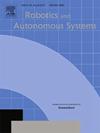基于回溯和语义边界探索的通信受限未知环境下多机器人交会
IF 5.2
2区 计算机科学
Q1 AUTOMATION & CONTROL SYSTEMS
引用次数: 0
摘要
多机器人交会问题是指将一组移动机器人协调到一个共同的位置。在有限的通信和未知的环境中,高效的分散执行在一些应用中是必不可少的,但是这种现实世界的机器人特征通常没有被理论的集合框架所捕获。在这项工作中,我们提出了一种解决这一问题的方法,该方法扩展了传统的基于边界的勘探策略,以促进在这种条件下的有效交会。我们的方法允许机器人回溯他们对环境的探索,并通过优先考虑走廊和走廊等高连接性区域来利用地图上的语义知识。我们定义并评估了我们方法的不同变体,以研究执行集合所需的时间和环境中发现区域的数量之间的权衡。在ROS中使用3D模拟进行了广泛的实验评估,证明了我们的方法的可行性及其在基线上的性能改进。本文章由计算机程序翻译,如有差异,请以英文原文为准。
Multi-robot rendezvous in communication-restricted unknown environments via backtracking and semantic frontier-based exploration
The multi-robot rendezvous problem requires coordinating a team of mobile robots to converge at a common location. Efficient decentralized execution with limited communication and in unknown environments can be essential in several applications, but such real-world robotic features are often not captured by theoretical rendezvous frameworks. In this work, we present an approach to this problem that extends traditional frontier-based exploration strategies to facilitate efficient rendezvous in such conditions. Our method allows robots to backtrack their exploration of the environment and exploit semantic knowledge on the map by prioritizing high-connectivity areas like corridors and hallways. We define and evaluate different variants of our method to study a trade-off between the time taken to perform a rendezvous and the amount of discovered area in the environment. Extensive experimental evaluation in ROS using 3D simulations demonstrates the feasibility of our method and its performance improvements over baselines.
求助全文
通过发布文献求助,成功后即可免费获取论文全文。
去求助
来源期刊

Robotics and Autonomous Systems
工程技术-机器人学
CiteScore
9.00
自引率
7.00%
发文量
164
审稿时长
4.5 months
期刊介绍:
Robotics and Autonomous Systems will carry articles describing fundamental developments in the field of robotics, with special emphasis on autonomous systems. An important goal of this journal is to extend the state of the art in both symbolic and sensory based robot control and learning in the context of autonomous systems.
Robotics and Autonomous Systems will carry articles on the theoretical, computational and experimental aspects of autonomous systems, or modules of such systems.
 求助内容:
求助内容: 应助结果提醒方式:
应助结果提醒方式:


